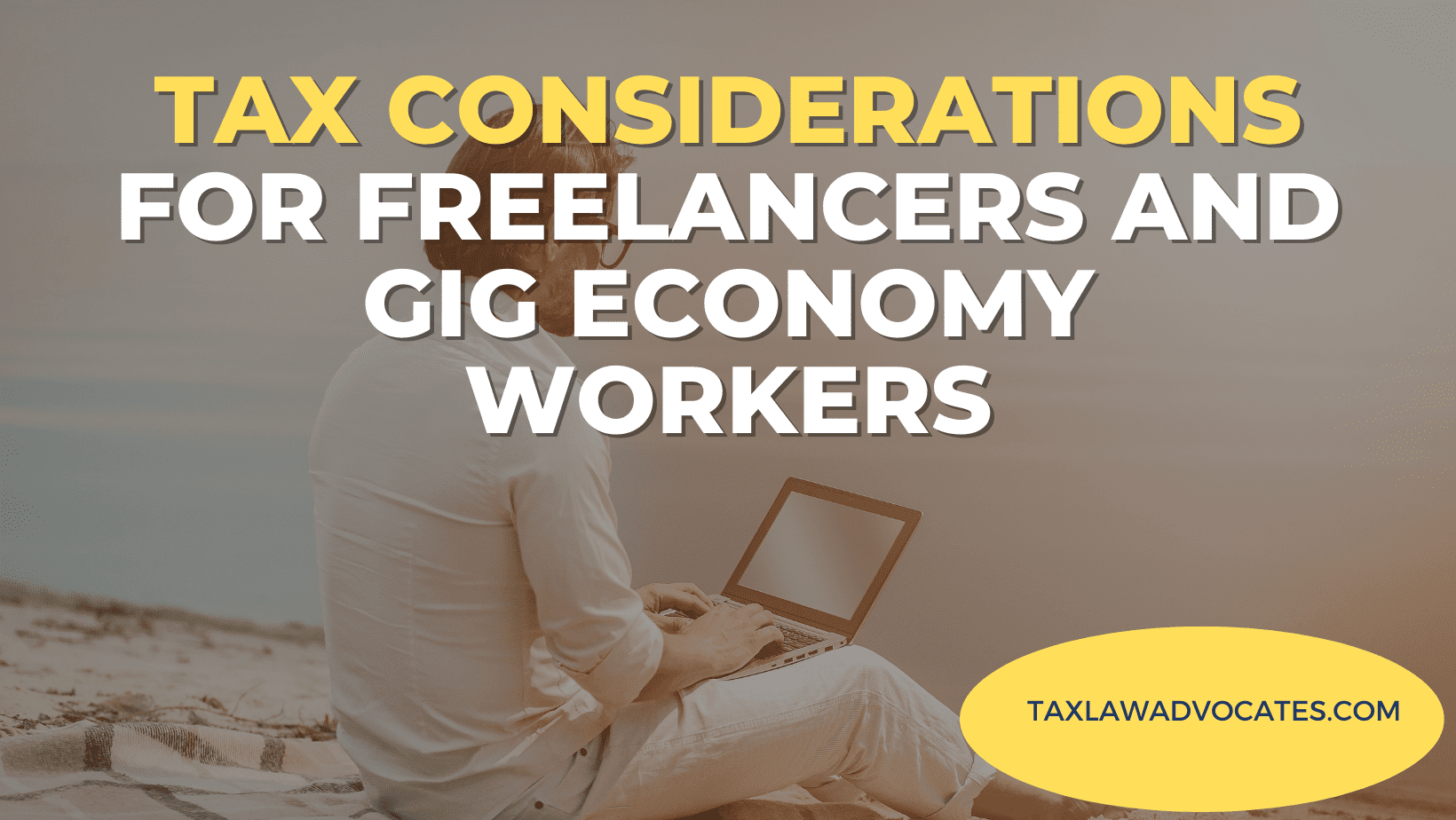The gig economy has revolutionized the modern workforce, offering flexibility, autonomy, and diverse income streams. Whether you’re driving for a ride-sharing platform, creating stunning graphics as a freelance designer, or tackling home repairs as a handyman, you’re part of a dynamic and evolving economy. However, with the freedom of gig work comes the responsibility of managing tax obligations. In this blog, we’ll explore the essential tax issues, forms, and considerations every gig worker should be familiar with, providing guidance on estimated tax payments, deductible expenses, and self-employment taxes. We’ll also highlight the importance of accurate record-keeping and the use of tax software or professional services.
Understanding Tax Obligations for Gig Workers
Income Recognition
As a freelancer or gig economy worker, you’re considered an independent contractor by the IRS, essentially a solo entrepreneur. This status comes with specific tax rules and obligations. Central to these obligations is the Form 1099 series, which includes Form 1099-NEC, Form 1099-K, and Form 1099-MISC. Regardless of whether you receive these forms, you must report your income to the IRS and state and local tax agencies.
Income in the gig economy includes all payments received for services rendered. This encompasses not just money but also the value of goods or services received in exchange for work. For example, if you perform services in exchange for goods, the fair market value of those goods is considered income. It’s essential to keep thorough records of all income received, as failure to report can result in significant penalties.
Key IRS Forms for Gig Workers
Form 1099-NEC
Form 1099-NEC, Nonemployee Compensation, is issued by clients who pay you $600 or more during the tax year. Unlike traditional employees who receive a Form W-2, gig workers receive a Form 1099-NEC to report their income to the IRS.
Form 1099-K
Form 1099-K, Payment Card and Third-Party Network Transactions, is issued by payment settlement entities if you receive more than $600 through third-party networks like PayPal or credit card transactions. Although the IRS delayed the implementation of the $600 threshold until tax year 2024, it’s crucial to report all income regardless of whether you receive a Form 1099-K.
Form 1099-MISC
Form 1099-MISC, Miscellaneous Income, captures income that doesn’t fit into other categories, such as rent from real estate or royalties. While it’s less common for gig workers, those with diversified income streams may encounter it.
Estimated Tax Payments
Quarterly Payments
Unlike traditional employees, gig workers don’t have taxes automatically withheld from their earnings. Instead, you’re responsible for making quarterly estimated tax payments to cover both income and self-employment taxes, which include Social Security and Medicare taxes. The due dates for 2024 are April 15, June 17, September 16, and January 15, 2025.
Avoiding Penalties
Failing to make estimated tax payments can result in penalties. The IRS bases penalties on underpayment or late payment of estimated taxes. To avoid penalties, spread your payments evenly throughout the year using IRS Form 1040-ES, Estimated Tax for Individuals, to calculate your quarterly payments.
Deductible Expenses
Business Expenses
Tax law allows you to deduct certain business expenses, reducing the amount of taxable income. Deductible expenses include:
– Office Supplies: Paper, pens, and other supplies necessary for your work.
– Equipment: Computers, cameras, and other tools required for your business.
– Home Office: A portion of your rent or mortgage, utilities, and other expenses if you use part of your home exclusively for business.
– Travel: Mileage for business travel, lodging, and meals when away from home for business.
– Marketing: Advertising costs, business cards, and website expenses.
Accurate Record-Keeping
Keeping detailed and accurate records of your income and expenses is crucial. This includes receipts, invoices, and bank statements. Good record-keeping not only helps in claiming deductions but also protects you in case of an IRS audit. Consider using accounting software or apps designed for freelancers to track your expenses efficiently.
Self-Employment Taxes
Calculation and Payment
As a gig worker, you’re responsible for paying self-employment taxes, which include both the employer and employee portions of Social Security and Medicare taxes. These taxes are calculated using IRS Schedule SE, Self-Employment Tax, which is filed with your annual tax return. For 2024, the self-employment tax rate is 15.3%.
Tax Withholding Options
If you have another job as an employee, you can adjust your Form W-4 to have additional tax withheld from your paycheck to cover your gig income. The IRS Tax Withholding Estimator tool can help determine the appropriate amount to withhold.
Name, Image, and Likeness (NIL) Income
Taxation of NIL Income
The rise of the gig economy has also seen an increase in opportunities for individuals to monetize their name, image, and likeness (NIL). This is particularly relevant for college athletes who can now earn income from endorsements and sponsorships. Like any other gig income, NIL income is taxable, and athletes must keep meticulous records of their earnings and expenses.
The Role of Professional Services
Tax Software
Using tax software can simplify the process of managing your tax obligations. Many software options are designed specifically for freelancers and gig workers, offering features like expense tracking, mileage logging, and estimated tax calculations.
Professional Services
Given the complexities of tax obligations for gig workers, consulting with tax professionals like Tax Law Advocates can provide valuable guidance. Professional services can help ensure that you comply with tax laws, maximize deductions, and avoid penalties.
Navigating the tax landscape as a freelancer or gig economy worker can be challenging, but understanding your obligations and taking proactive steps can make the process more manageable. Keep accurate records, make timely estimated tax payments, and consider using tax software or professional services to simplify your tax management.
For personalized assistance and expert advice on managing your tax obligations as a gig worker, contact Tax Law Advocates at 855-612-7777 or visit our website. Our team of professionals is dedicated to helping you navigate the complexities of the gig economy and ensuring your financial success.






